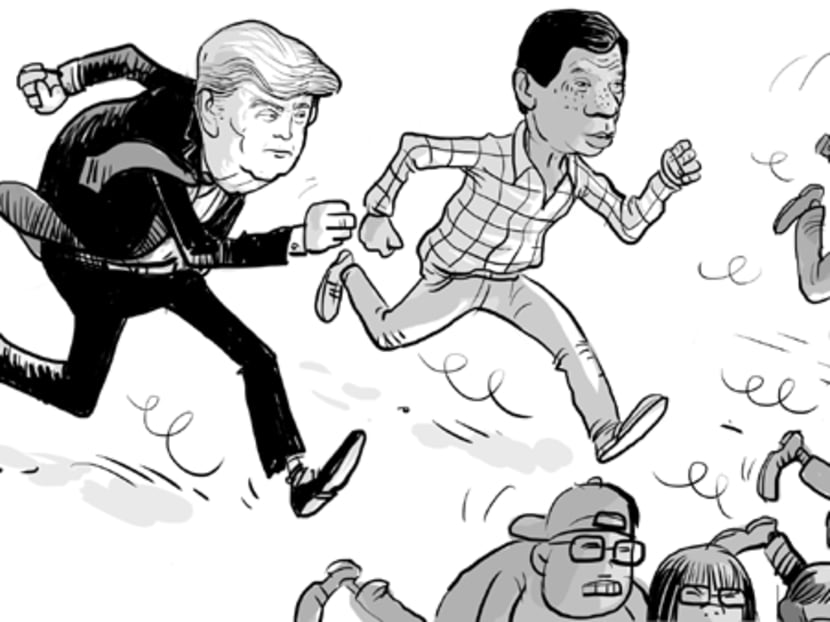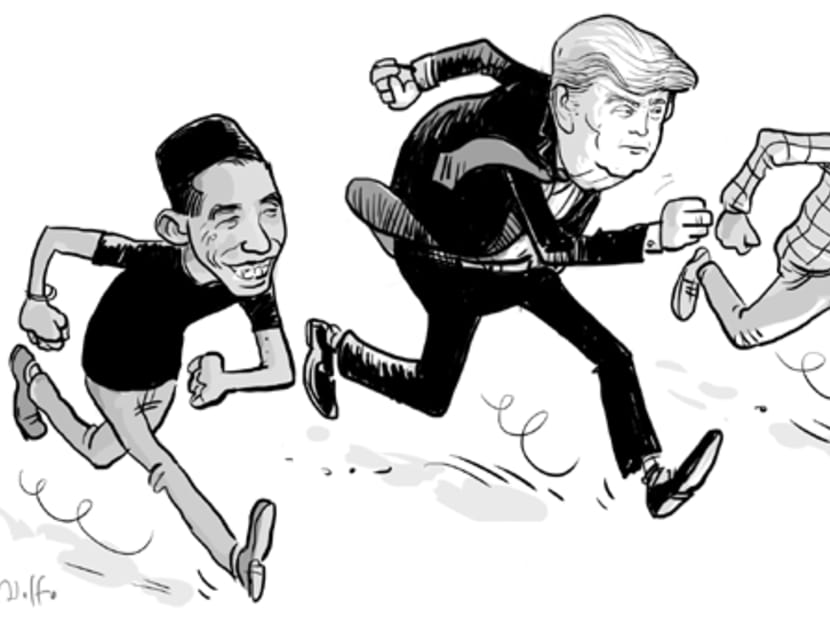The rise of the destabilising middle class
There is a quote, probably apocryphal, that is widely attributed to the 19th century radical French politician Alexandre Auguste Ledru-Rollin. The story goes that he had observed a mob running by him, and he is supposed to have said: “There go my people. I must find out where they are going so that I can lead them.”

There is a quote, probably apocryphal, that is widely attributed to the 19th century radical French politician Alexandre Auguste Ledru-Rollin. The story goes that he had observed a mob running by him, and he is supposed to have said: “There go my people. I must find out where they are going so that I can lead them.”
That quote very aptly explains what lies behind the electoral successes of Mr Joko Widodo in Indonesia, Mr Rodrigo Duterte in the Philippines, as well as the emergence of Ms Marine Le Pen in France, Mr Geert Wilders in the Netherlands and, of course, Mr Donald Trump as the presumptive Republican candidate for the White House, among others.
In the case of Mr Widodo and Mr Duterte, their rise has been primarily driven by an unabashed anti-elitism and anti-establishmentarianism. In Europe, Ms Le Pen and Mr Wilders owe their rise mainly to anti-immigrant rhetoric that is barely concealed xenophobia. And in Mr Trump, we see all these elements meshed together by a highly-honed instinct for spectacle that is indistinguishable from demagoguery.
The common thread linking all these politicians is how effectively they have tapped into the defining mood of their respective countries. Clearly, they had long figured out where the people, or at least significant numbers of them, are going and have deftly moved to the front of the mob to lead them.
What is surprising about this wave of primeval, Manichean populist politics is how much it appeals to the middle class. But what then explains the sudden attraction of such radical populism to a voter segment that has traditionally regarded such messages with suspicion and distaste?
The middle class in democratic polities, which all of the countries cited above ostensibly are, has always been a stabilising force in political, economic and social terms. The middle class has always been the primary builder of broad-based affluence within society and the emblem of social mobility. In many ways, growing and buttressing the middle class is not only a national objective, but also a symbol of a mature, stable and fair society.
But globally now, the middle class in many countries finds itself in a crisis. Having borne the brunt of recent traumatic changes, such as job losses in the face of economic restructuring, immigration and the growing wealth divide globally and in their own countries, the economic and political position of the middle class has been so eroded that the group itself is shrinking and risks disintegration.
The “middle-class squeeze” is now a shorthand for the diminished, even downward, mobility of a group of people who still identify with middle-class aspirations and sensibilities, but are now thwarted in their attempts to realise them in leisurely pursuits, decent jobs and wages, home ownership, higher education for their children, and, above all, a sense of security vis-a-vis the future.
The anxieties and anger of the middle class have manifested themselves in a disengagement from mainstream politics and disenchantment with the elites. Simply put, the middle class is unwilling, and in many cases unable, to play its traditional stabilising role in society. Quite the contrary, the middle class is now the seedbed of populist politics, and is seen as the willing fodder for populist parties and politicians.
Populist parties propose a suite of superficial, “common sense” solutions, often framed in a stark Manichean worldview of us-versus-them, inside-versus-outside. These crude, oversimplifying approaches enjoy great appeal because they seem to reduce the complexities of 21st century challenges, and therefore assuage that paralysing sense of anxiety. By laying the plight of the squeezed middle on the doorstep of establishment figures, it requires no great leap of the imagination to also call into question the fundamental legitimacy of the political system itself.
What this sets into motion is a vicious circle: As levels of anxieties rise, the logic of populism gains greater traction, resulting in the mistrust in elites, cynicism with regards to political institutions and greater demands for a politics of exclusion. This in turn further inhibits the already-weakened ability of institutions to address the middle-class anxieties, to say nothing of the very real underlying economic and social problems. And so it goes on.
To be sure, any democratic system carries within it the seeds of populism. The main reason for this is the inevitable development of a political elite in a democratic system, and the ensuing elite-public divide. There is thus always an opening for populist voices to claim to speak for the “real people”. Indeed, the appeals of Mr Trump and Mr Duterte have less to do with the details of their policies, and more to do with “keeping it real” and “saying it like it is”.
In Singapore, even if the possibility of such a radical populism erupting is remote, let us not forget that the preconditions for it are all too present. The middle class here is also confronting a host of bewildering challenges that is generating anxiety and restiveness. And, just as importantly, the sense of disconnect between the Government and the people was also an issue highlighted by many Singaporeans during the Our Singapore Conversation initiative.
This current wave of populism in other countries that is targeted not only at particular elites but at the very notion of elitism is very much driven by the middle class. That the middle class is willing to risk more uncertainties and instability by calling into question the system itself speaks to a breakdown of trust and a sense of there being not much else to lose.
The question now is not so much where the demagogues are leading the people, but where the people are leading the demagogues.
ABOUT THE AUTHOR:
Dr Adrian W J Kuah is Senior Research Fellow at the Lee Kuan Yew School of Public Policy, National University of Singapore










